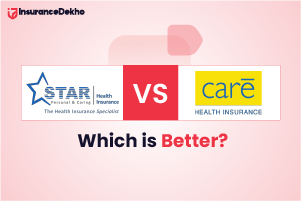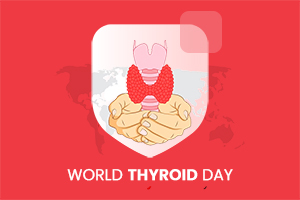

- Tax BenefitUp to 75000**
- Claim SupportEveryday 10AM-7PM
- 45 Lacs+Happy Customers
*Standard Terms and Conditions Apply.
**Tax benefits are subject to changes in Income Tax Act.
Basics of Deductible in Medical Billing with Example
Deductible in health insurance is the amount that the insured is required to pay before the insurance company starts offering the coverage benefits in case of a claim. This means that the insurance company is required to pay the claim amount only if it exceeds the deductible amount. But in case the claim amount is less than the deductible, then the insurance company is not liable to pay anything. Also, note that the premium for high deductible health insurance plans is low whereas the premium for low deductible policies comes at a higher premium.
For example, if the deductible under a health insurance policy is Rs. 30,000, and the insured makes a claim of Rs. 40,000, then the insurance company shall pay Rs. 10,000 only. But if the claim amount is less than the deductible, then the health insurance company is not liable to pay any amount.
In short, your insurance provider is responsible for covering expenses that extend the deductible amount. Deductible insurance prevents you from making unnecessary treatment and hospitalisation. As the insured has to pay a share of the claim amount with a deductible, hence, they refrain from making claims for minor injuries just because they have a health insurance policy.
Types of Deductibles in Health Insurance
Health insurance deductibles are mainly of two types in India. These are Compulsory Deductible and Voluntary Deductible. In the international market, there are other deductibles offered too including comprehensive deductibles, non-comprehensive deductibles, as well as cumulative deductibles. The two main types of deductibles in medical billing are explained below:
1. Compulsory Deductible
A compulsory deductible is an amount fixed by the insurance company that the insured is required to pay whenever a claim is raised. For instance, if the compulsory deductible is Rs. 20,000 and the hospitalisation bill is Rs. 60,000, then the insured will be required to pay Rs. 20,000 and the insurance company will pay the rest of the amount which is Rs. 40,000. This can be in the form of the percentage of the sum insured as well, as decided by the insurance company. In the case of compulsory deductible, there is no lowering of the health insurance premium.
2. Voluntary Deductible
A voluntary deductible is an amount chosen by the insured that he/she would like to pay from his own pocket as and when a claim settlement arises. The chosen amount may depend on the financial affordability as well as the medical expenses of the insured. If the insured opts for a higher deductible, then he/she will be required to pay a lesser premium, and vice versa. Voluntary deductible can be when the insured does not have a prolonged illness and may not need financial assistance from the insurance company.
For instance, if the insured has opted for a voluntary deductible of Rs. 50,000 and the claim amount is Rs. 90,000, then he/she will be required to pay Rs. 50,000 and the insurance company will pay the rest of the amount which is Rs. 40,000. This deductible helps when the insured does not raise claims frequently and wants to pay a lesser premium for a health insurance policy.
How do Deductibles in Health Insurance Work?
Deductibles in health insurance act as a deterrent to raising small and unnecessary claims just because there is health insurance coverage. For instance, a health insurance policy that has a higher deductible amount will deter the insured from raising small claims as the deductible amount will be paid by him/her. Also, not making any claim will help the insured keep the No Claim Bonus (NCB) safe. Therefore, the insured is prompted to raise a claim only in case of high medical expenses and not for any minor expenses. As the insured has to pay the deductible amount before the insurance provider pays the rest of the claim amount, it eliminates any unnecessary claims thereby increasing the chances of getting rightful claims.
Advantages of Deductibles in Health Insurance
Deductibles in health insurance offer the following benefits to the insured:
- They help in reducing the health insurance premium. Also, if the insured opts for voluntary deductibles, then the insurance company may also offer discounts.
- It discourages the insured from raising claims of small amounts, which helps the insured earn a No Claim Bonus (NCB) that can be used to increase the coverage of the primary health insurance policy.
- Despite the applicable deductibles, the insured can get access to health insurance coverage during medical emergencies or unforeseen hospitalization.
Disadvantages of Deductible Insurance
It is true that deductibles come with decreased health insurance premiums, but there are certain disadvantages that they bring along:
- The insured will be required to bear the medical expenses, even if they do not have the financial resources to pay for them. This is because the benefits under a health insurance plan with a deductible can only be availed after the deductible is paid by the insured.
- In case of a higher deductible, the insured will be required to pay from their own pocket, which can reduce the savings. Also, the financial burden can be huge if there are multiple medical emergencies.
Difference Between Deductible Insurance, Co-Insurance, and Co-Pay in Health Insurance?
Deductible, co-pay, and co-insurance are key features of health insurance plans. In order to make a more informed buying decision, you must understand these terms thoroughly.
- Deductible: As discussed above, deductible insurance is a fixed amount that the insured has to pay in case of a claim before the insurance company offers the remaining coverage. It is a key feature in super top-up and top-up health insurance plans. After the deductible is paid by the insured, the insurance company will start offering coverage if the total claim amount exceeds the deductible. The insurance company will bear all the medical expenses covered under the policy, as per its terms and conditions stated in the policy document. For instance, you have a health insurance policy cover of Rs. 5 Lakh and the deductible is set at Rs. 10,000. In this case, if a person raises a claim of Rs. 50,000, then you will be required to pay the deductible amount before the insurance company can enter the scene to offer coverage benefits. The insurance company will then cover you for the remaining Rs. 40,000, which is calculated after deducting Rs. 10,000.
2. Co-payment: The co-payment clause works a little differently. It can either come as an in-built feature in a health insurance policy or can be purchased as an add-on benefit. Under this feature, the insured agrees to pay a fixed percentage or sum of medical expenses. So, unlike deductible, which has to be paid once, co-payment means that the insured has to pay a portion of medical expenses at the time of claim.
For instance, your health insurance policy comes with a co-payment clause of Rs. 2,000 for treatment expenses and you make a claim of Rs. 10,000. Then the insurance company will only cover you for Rs. 8,000 and you will be required to pay Rs. 2,000 as agreed. Similarly, in the case of percentage, suppose a health insurance policy comes with a co-payment of 10%, then you will be required to pay Rs. 1,000 while the insurance company will bear the remaining Rs. 9,000.
3. Co-insurance: Co-insurance, similar to the co-payment clause, is the percentage of treatment expenses that the insured is required to pay after paying the deductibles, which is generally offered as a fixed percentage. For instance, if a health insurance policy has a co-insurance clause of 20%, then the insurance company will bear the rest 80% and the insured will be required to pay 20% of the expenses incurred. The only difference is that in this case, the amount is generally calculated after the deductibles are paid.
Do you Know About Section 80D Medical Expenditure Benefits?
Section 80D is a crucial part of the Indian Income Tax Act, and it can significantly impact your healthcare expenses. Under this section, you can claim tax deductions on premiums paid for health insurance policies. The government introduced this provision to encourage individuals to secure their health while reducing the financial burden associated with medical bills.
The benefits provided by Section 80D can be availed by individuals, families, and senior citizens. It essentially offers tax deductions on the premium amount you pay for your health insurance policy.
NOTE: The deductions vary based on the age of the insured persons. For those below 60 years, the maximum deduction limit is higher compared to senior citizens.
Undoubtedly, the health insurance premium is lower when the insured opts for a higher deductible. But it can be helpful in case of several medical emergencies. The insurance company will bear the most claim amounts. But if someone does not have a prolonged illness, or does not expect any medical expenses, then they can go for a higher deductible and enjoy lower health insurance premiums.
Buy Coronavirus Health Insurance Policy
Health Insurance Calculator
Whom do you want the insurance for ?
Select the age of all members
- You
Where do you live ?
Choose required Coverage for yourself?

*Tax benefits are subject to changes in Income Tax Act.
Types of Health Insurance Plans
Health Insurance Terminologies
Buy Critical Illness Health Insurance
Learn more about deductible Health Insurance
Best Insurance Advisors in Your City.
FAQ About What are Deductibles in Health Insurance in India?
-
-
What are the types of health insurance deductible?
In health insurance, there are two types of deductibles. These are explained below:
- Compulsory deductible: It is a fixed amount that the insured individual is required to pay in case a claim arises. A compulsory deductible is decided by the insurance company.
- Voluntary deductible: Voluntary deductible is an amount that the insured individual chooses to pay from his/her own pocket in case a claim arises. The amount chosen may depend on the financial affordability as well as medical expenses incurred by the policyholder.
-
Do health insurance premiums count towards deductible?
In the case of compulsory deductible, there is no lowering of the premium. Whereas, in case of voluntary deductible, the higher the amount is, the lower your health insurance premium will be. This is because of voluntary deductibles, the reliability of the insurance company decreases.
-
Should you choose a higher or lower deductible?
When choosing a health insurance deductible, you should only think about lowering your premium, but also focus on the health issues you face as well as the frequency of claims you are expected to make in a financial year. If you are expecting low medical expenses, then you can go for a higher deductible plan. But if you are someone who would not want to pay an extra amount at the time of claim, then you should avoid going for voluntary deductibles or opt for a very less amount.
-
What happens if I do not pay the required deductible amount?
If you are unable to pay the deductible amount, then there is a chance that you would not be able to avail the required treatment right away. In case the insurance company requires the deductible amount to be paid before it provides you with the cover, then you will be required to find a way to pay the required deductible.











































.jpg)
























